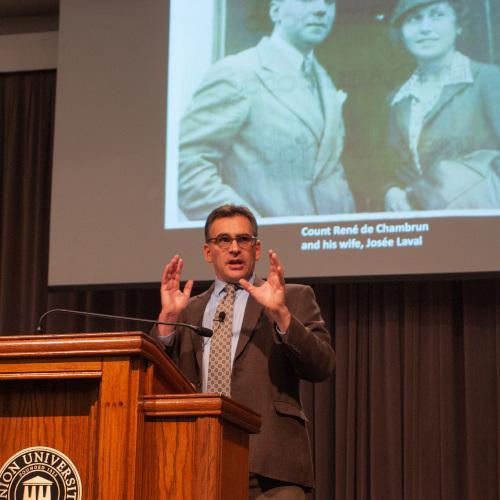JACKSON, Tenn. — Oct. 27, 2022 — Michael Neiberg said the fall of France in World War II was a cataclysmic event that posed a massive quandary to the United States as leaders considered how to respond.
“All American military planning up until May of 1940 had presumed that the French army would do in the second World War what it had done in the first,” Neiberg said. “It would hold the German army off long enough for the United States to decide when and how it wished to enter the war.”
Neiberg, the chair of war studies at the United States Army War College, spoke Oct. 24 as part of the 25th annual Carls-Schwerdfeger History Lecture at Union University.
The Carls-Schwerdfeger History lectureship is an annual history lecture that seeks to bring historians from around the country to lecture on various historical topics for the Union community. Neiberg’s afternoon address focused on World War I, while his evening lecture explored the significance of France’s fall to Germany in World War II.
Neiberg said the fall of France during WWII caused similar emotions throughout the American public as in recent world events such as the COVID-19 pandemic and the Sept. 11, terrorist attacks in 2001.
“The first thing I want to impress on you is how much of a shock this was to Americans,” Neiberg said.
In addition to addressing the shock caused by the fall of France, Neiberg’s lecture also focused on the complicated relationship between France and Germany during WWII, particularly in Vichy, France, a French region with strong support for the German war effort.
“America’s relationship with Vichy France is unbelievably unpopular,” Neiberg said, referring to American public opinions surrounding Vichy during the war.
His lecture discussed the tensions between Vichy, Germany and the rest of France as well as the American allies. This tension between Vichy and the allies caused disagreements, confusion and fear both amongst American citizens and American military forces.
“What the Americans quickly realized is that their policy with Vichy was failing and they needed to do something else,” Neiberg said. “The something else was to get American forces somewhere in the French empire and figure out a way to influence events going on.”

